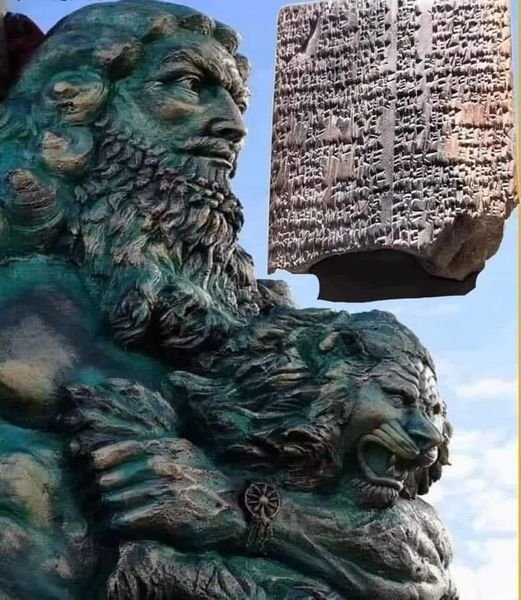Philosophical Clay Tablet from Gilgamesh Epic in Ancient Mesopotamia
Deep philosophical reflection from the Gilgamesh Epic about life and death.

- Introduction: The Philosophical Clay Tablet from the Gilgamesh Epic
- Historical Context of the Gilgamesh Epic
- Philosophical Insights in the Tablet
- Analysis of the Text: Life, Death, and Enjoyment
- The Tablet's Modern Relevance
- Conclusion: A Timeless Message from Ancient Mesopotamia
Philosophical Clay Tablet from Gilgamesh Epic in Ancient Mesopotamia
Introduction: The Philosophical Clay Tablet from the Gilgamesh Epic {#introduction}
In the heart of Ancient Mesopotamia, the Epic of Gilgamesh stands as one of the oldest literary works, offering timeless reflections on life, death, and human purpose. A significant passage inscribed on a clay tablet captures the essence of human existence, highlighting the acceptance of mortality while encouraging the pursuit of joy in everyday life. This profound message is now preserved in the Pergamon Museum in Germany, offering modern audiences a glimpse into ancient wisdom.
Historical Context of the Gilgamesh Epic {#historical-context}
The Gilgamesh Epic originates from Ancient Mesopotamia, which is considered one of the cradles of civilization. Written in Akkadian cuneiform, the epic dates back to the 3rd millennium BCE, narrating the adventures of Gilgamesh, the king of Uruk. This epic encompasses themes of friendship, the quest for immortality, and the nature of human suffering. Over centuries, the story evolved, and its core messages remained relevant across various cultures.
Philosophical Insights in the Tablet {#philosophical-insights}
The clay tablet carries a profound conversation between Gilgamesh and a figure reminding him of life's limitations and how the gods have reserved immortality for themselves. The philosophical passage can be interpreted as a call to embrace the finite nature of human life. By advising Gilgamesh to focus on simple pleasures—good food, clean clothing, family ties—the text encourages a balanced, mindful approach to existence.
This philosophy reflects an Ancient Mesopotamian understanding of the afterlife, where rather than striving for immortality, individuals should savor the fleeting beauty of life.
Analysis of the Text: Life, Death, and Enjoyment {#analysis-of-the-text}
The key section of the text reads as follows:
"To where are you hastening, Gilgamesh? The life you seek, you will not find. When the gods created mankind, they assigned death to men and kept life in their own hands."
This passage reflects a clear dichotomy between the divine and human realms, where the gods retain eternal life while humanity must contend with death. However, the narrative shifts into a pragmatic acceptance, urging Gilgamesh to embrace joy:
"Let your belly be full, Gilgamesh; be merry day and night, celebrate every day of your life. Wash your clothes, bathe yourself, and cherish the little one holding your hand, the wife at your side—this is the portion of humanity."
The advice here is practical yet deeply philosophical, urging individuals to relish life’s simple joys rather than being consumed by the pursuit of the unattainable—eternal life. It reflects a philosophy of carpe diem (seize the day) long before such ideas were articulated by later Western thinkers.
The Tablet's Modern Relevance {#modern-relevance}
The messages from the Epic of Gilgamesh continue to resonate in modern times. In a world where people often struggle with existential questions and the fear of mortality, this ancient text provides solace. The call to focus on the present, on relationships, and on life's simple pleasures is a reminder that these values transcend time and culture.
By recognizing that life is short, we are encouraged to live more fully and appreciate the moments we often overlook. The wisdom of the Mesopotamians remains relevant, serving as a gentle reminder to balance the struggles of life with moments of celebration and reflection.
Conclusion: A Timeless Message from Ancient Mesopotamia {#conclusion}
The clay tablet from the Epic of Gilgamesh, housed in the Pergamon Museum, delivers a timeless message about the nature of life and death. Through its philosophical reflections, it urges us to enjoy the fleeting beauty of life, accept mortality, and live with joy. This ancient wisdom, preserved on a humble piece of clay, continues to inspire and offer guidance in the modern world.
FAQs
1. What is the main message of the clay tablet in the Gilgamesh Epic?
The tablet urges people to accept death as an inevitable part of life and focus on enjoying simple pleasures, such as family, celebrations, and everyday joys.
2. Why is the Gilgamesh Epic important?
The Epic of Gilgamesh is one of the oldest literary works in human history, offering insights into human nature, mortality, and the quest for meaning.
3. Where is the clay tablet from the Gilgamesh Epic displayed?
The clay tablet is displayed in the Pergamon Museum in Germany.
4. How does the Gilgamesh Epic address death?
It portrays death as an unavoidable fate, encouraging acceptance while emphasizing that life should be filled with joy and lived to the fullest.
This article reflects timeless human wisdom, guiding readers through the lessons of Ancient Mesopotamian philosophy on life's impermanence.
Internal Links:
- Explore more about Mesopotamian philosophy on Kiksee’s philosophy tag.
- Discover other ancient texts by searching Ancient literature on Kiksee.
- For more articles on Mesopotamian culture, visit Kiksee’s culture section.
What's Your Reaction?






















